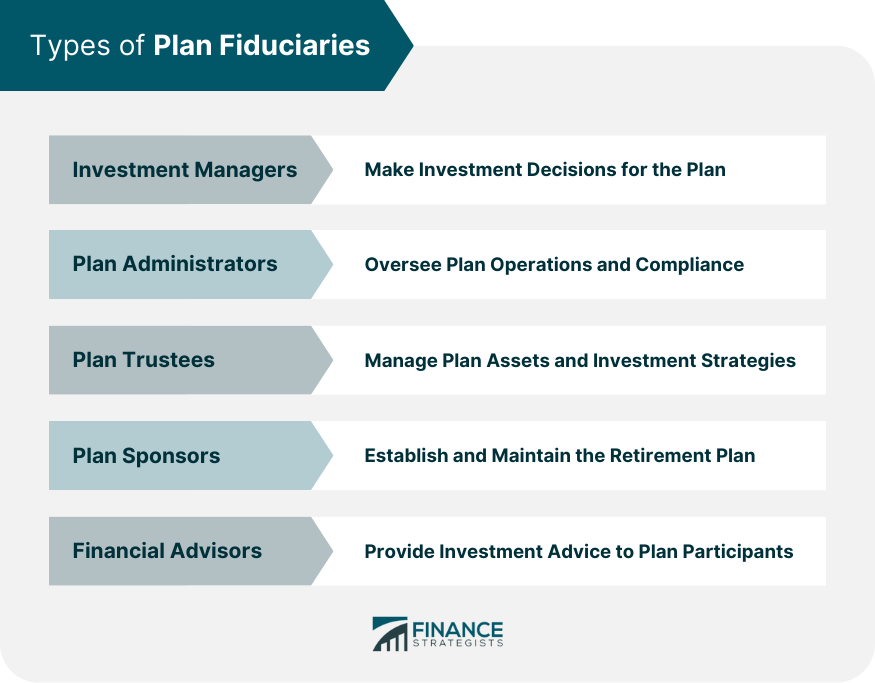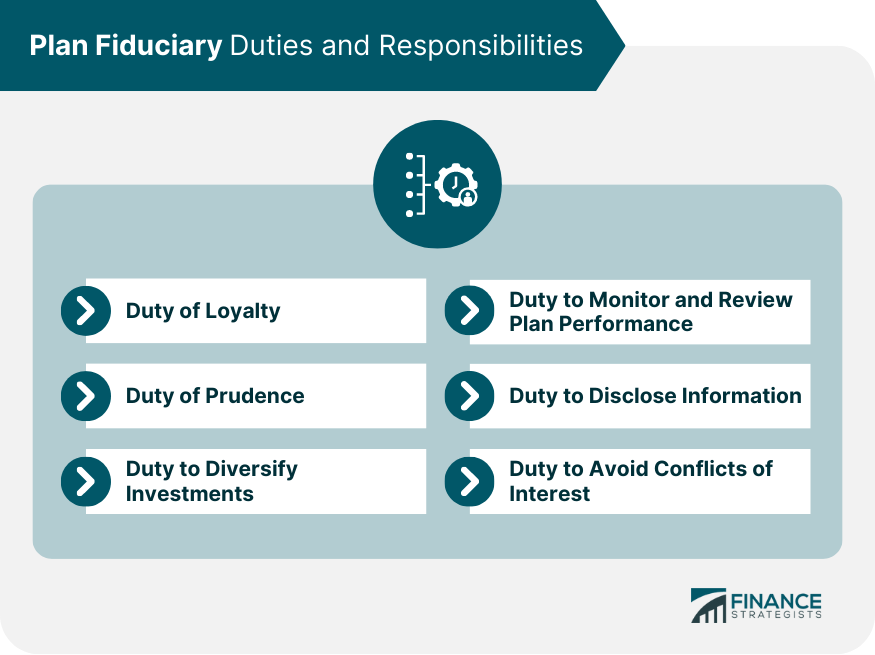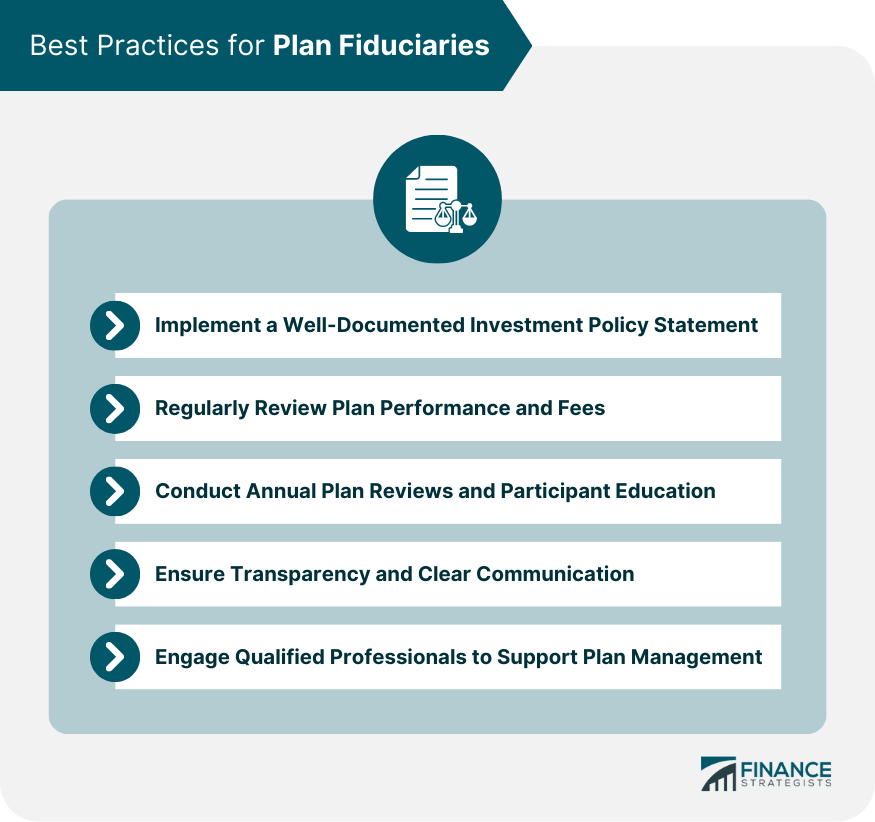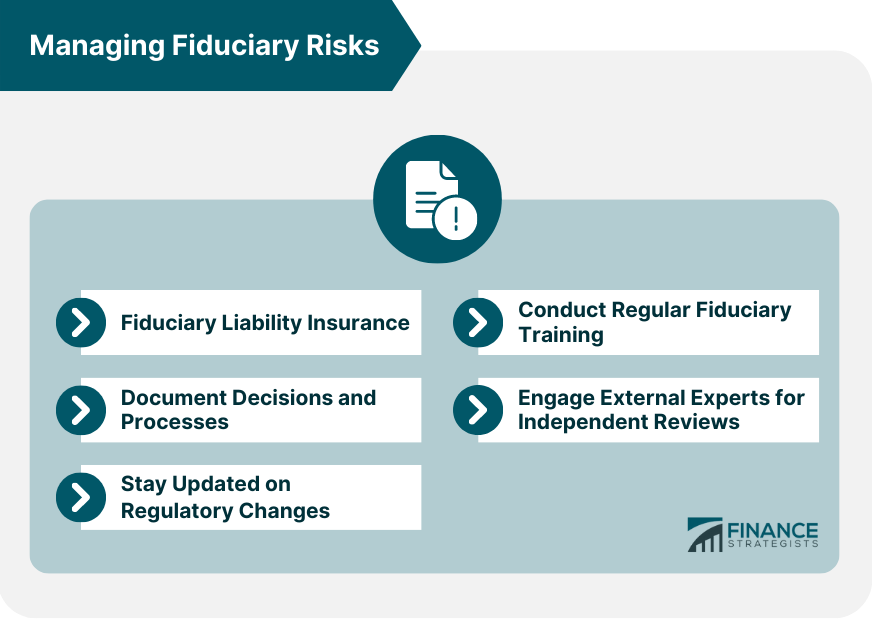A plan fiduciary is an individual or entity responsible for managing a retirement plan in the best interests of its participants. This includes making investment decisions, selecting and monitoring service providers, and ensuring that fees and expenses are reasonable. Fiduciaries must act with care, prudence, and diligence and avoid conflicts of interest that could harm the plan or its participants. Their ultimate goal is to ensure that the plan is managed in a way that maximizes retirement benefits for plan participants. There are several types of plan fiduciaries, each with its own set of responsibilities and expertise. Investment managers are responsible for making investment decisions on behalf of the plan. They are required to act prudently and in the best interest of the plan participants. Plan administrators oversee the day-to-day operations of the plan, including enrollment, record-keeping, and compliance with relevant regulations. Trustees are responsible for managing the assets of the plan and ensuring that they are invested according to the plan's investment policy statement. Plan sponsors are typically the employers who establish and maintain the retirement plan for their employees. They have a fiduciary duty to ensure that the plan is managed in the best interest of the participants. Financial advisors may provide investment advice and guidance to plan participants, helping them make informed decisions about their retirement savings. Plan fiduciaries are subject to various legal and regulatory requirements that govern their conduct and responsibilities. ERISA is a federal law that sets minimum standards for retirement and health plans in private industry. It requires fiduciaries to act prudently and in the best interest of plan participants. The DOL is responsible for enforcing ERISA and has issued regulations that provide guidance on the responsibilities of plan fiduciaries. The IRS provides guidance on the tax aspects of retirement plans, including the treatment of contributions, distributions, and plan loans. The SEC regulates the securities industry, including investment advisors and broker-dealers, who may be involved in providing services to retirement plans. Plan fiduciaries have several key duties and responsibilities, which include: Fiduciaries must act solely in the interest of plan participants and their beneficiaries, putting their interests above any other considerations. Fiduciaries are required to act with care, skill, prudence, and diligence in carrying out their responsibilities. Fiduciaries must ensure that the plan's investments are diversified to minimize the risk of large losses. Fiduciaries must regularly monitor and review the performance of the plan, including its investment options and service providers. Fiduciaries have a duty to provide plan participants with the information they need to make informed decisions about their retirement savings. Fiduciaries must avoid conflicts of interest and act independently when making decisions on behalf of the plan. To effectively fulfill their responsibilities, plan fiduciaries should adopt the following best practices: A clear and comprehensive IPS provides guidance on the plan's investment objectives, risk tolerance, and asset allocation strategy. Fiduciaries should conduct periodic reviews of the plan's investment performance and fees to ensure that they remain competitive and in line with the plan's objectives. Annual plan reviews can help identify areas for improvement and ensure that the plan remains compliant with regulations. Providing ongoing education for plan participants is also crucial in helping them make informed decisions about their retirement savings. Fiduciaries must maintain open lines of communication with plan participants and provide them with accurate, timely, and relevant information about their retirement plan. Hiring experienced professionals, such as investment advisors, attorneys, and third-party administrators, can help fiduciaries manage their responsibilities and mitigate risks more effectively. Fiduciaries should take proactive steps to minimize potential risks associated with their role: Fiduciary Liability Insurance: Obtaining fiduciary liability insurance can help protect fiduciaries from financial losses arising from claims related to the management of the retirement plan. Documenting Decisions and Processes: Maintaining thorough documentation of all decisions and processes related to the plan can help demonstrate that fiduciaries have acted prudently and in the best interest of the participants. Staying Updated on Regulatory Changes: Fiduciaries should stay informed about changes in laws and regulations that may impact their responsibilities and the management of the retirement plan. Conducting Regular Fiduciary Training: Ongoing fiduciary training can help ensure that fiduciaries understand their duties and stay current with best practices in plan management. Engaging External Experts for Independent Reviews: Seeking input from external experts can provide valuable insights into potential areas for improvement and help fiduciaries maintain a high standard of care. Fiduciary breaches can have severe consequences, including: Legal and Financial Ramifications: Fiduciaries may be held personally liable for losses resulting from their breaches and may face civil penalties or even criminal charges. Impact on Plan Participants: Breaches of fiduciary duty can lead to reduced retirement savings and financial security for plan participants. Reputational Damage: Fiduciary breaches can cause significant reputational harm to the fiduciary and the organization they represent, potentially impacting the organization's ability to attract and retain employees. Remedies and Corrective Actions: In the event of a fiduciary breach, appropriate corrective actions must be taken to remedy the situation and prevent future occurrences. Plan fiduciaries play a crucial role in managing retirement and investment plans, acting in the best interests of plan participants. With various types of fiduciaries, each has specific responsibilities related to the management and oversight of the plans. Legal and regulatory frameworks, such as ERISA, DOL regulations, IRS guidelines, and SEC rules govern them. Fiduciaries must adhere to key duties, including loyalty, prudence, diversification, monitoring, disclosure, and avoiding conflicts of interest. By adopting best practices, engaging qualified professionals, and staying informed about regulatory changes, fiduciaries can effectively manage their responsibilities and minimize risks. It is essential to understand the potential consequences of fiduciary breaches and take corrective actions to ensure the financial well-being of plan participants. By learning from case studies and examples, fiduciaries can enhance their compliance and contribute to securing the financial future of the individuals they serve.Definition of Plan Fiduciary
Types of Plan Fiduciaries

Investment ManagersPlan Administrators
Plan Trustees
Plan Sponsors
Financial Advisors
Legal and Regulatory Framework for Plan Fiduciaries
Employee Retirement Income Security Act (ERISA)
Department of Labor (DOL) Regulations
Internal Revenue Service (IRS) Guidelines
Securities and Exchange Commission (SEC) Rules
Fiduciary Duties and Responsibilities

Duty of Loyalty
Duty of Prudence
Duty to Diversify Investments
Duty to Monitor and Review Plan Performance
Duty to Disclose Information
Duty to Avoid Conflicts of Interest
Best Practices for Plan Fiduciaries

Implementing a Well-Documented Investment Policy Statement (IPS)
Regularly Reviewing Plan Performance and Fees
Conducting Annual Plan Reviews and Participant Education
Ensuring Transparency and Clear Communication
Engaging Qualified Professionals to Support Plan Management
Managing Fiduciary Risks

Consequences of Fiduciary Breaches
Final Thoughts
Plan Fiduciary FAQs
A plan fiduciary is an individual or entity responsible for managing retirement or investment plans, such as a 401(k) or pension plan. Their role is crucial because they have a legal obligation to act in the best interests of the plan participants, ensuring that the plan is managed prudently and effectively.
Various professionals can serve as plan fiduciaries, including investment managers, plan administrators, plan trustees, plan sponsors (typically employers), and financial advisors. Each type of fiduciary has specific responsibilities related to the management and oversight of retirement or investment plans.
Plan fiduciaries must adhere to several key duties, including the duty of loyalty (acting solely in the interests of plan participants), duty of prudence (acting with care, skill, and diligence), duty to diversify investments, duty to monitor and review plan performance, duty to disclose information, and duty to avoid conflicts of interest.
Plan fiduciaries can minimize risks and manage their responsibilities by adopting best practices, such as implementing a well-documented investment policy statement, regularly reviewing plan performance and fees, conducting annual plan reviews and participant education, ensuring transparency and clear communication, and engaging qualified professionals to support plan management. Additionally, they should consider obtaining fiduciary liability insurance and staying updated on regulatory changes.
The consequences of a plan fiduciary breach can include legal and financial ramifications, impact on plan participants' financial security, and reputational damage to the fiduciary and their organization. To address these breaches, fiduciaries must take appropriate corrective actions to remedy the situation, such as making plan participants whole, and implement measures to prevent future occurrences.
True Tamplin is a published author, public speaker, CEO of UpDigital, and founder of Finance Strategists.
True is a Certified Educator in Personal Finance (CEPF®), author of The Handy Financial Ratios Guide, a member of the Society for Advancing Business Editing and Writing, contributes to his financial education site, Finance Strategists, and has spoken to various financial communities such as the CFA Institute, as well as university students like his Alma mater, Biola University, where he received a bachelor of science in business and data analytics.
To learn more about True, visit his personal website or view his author profiles on Amazon, Nasdaq and Forbes.















